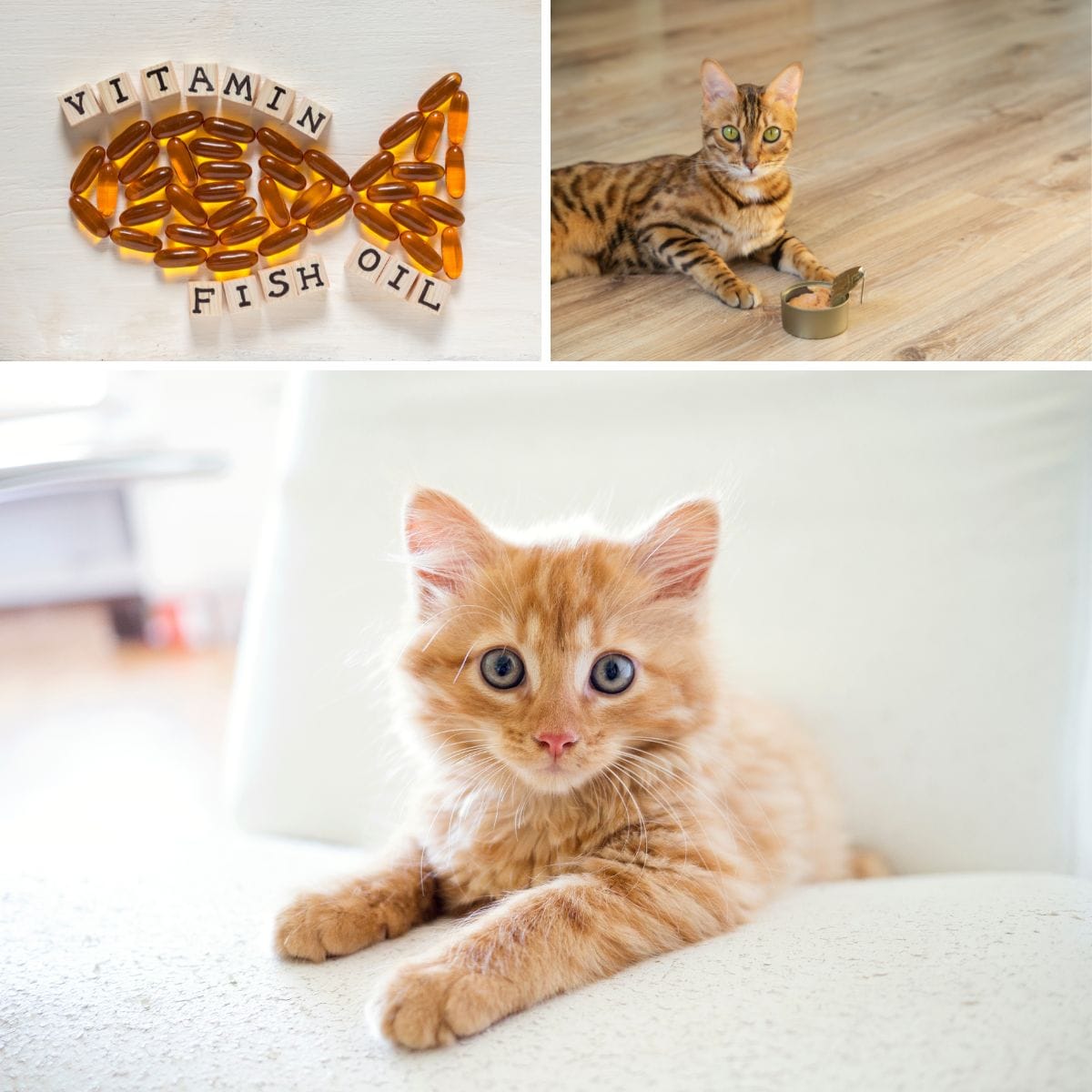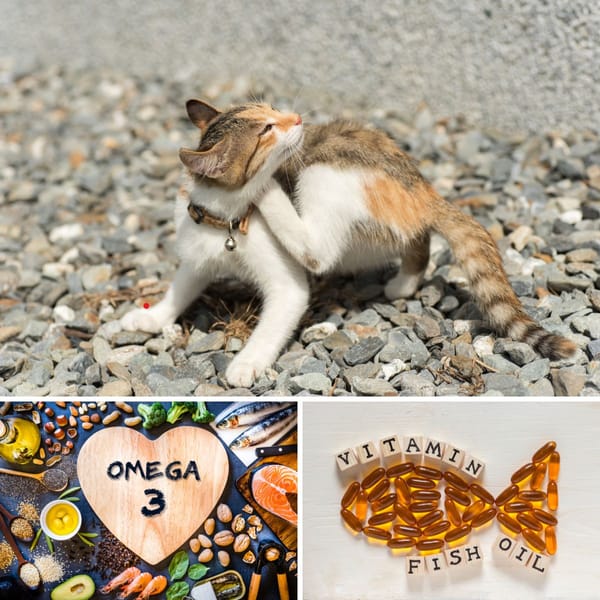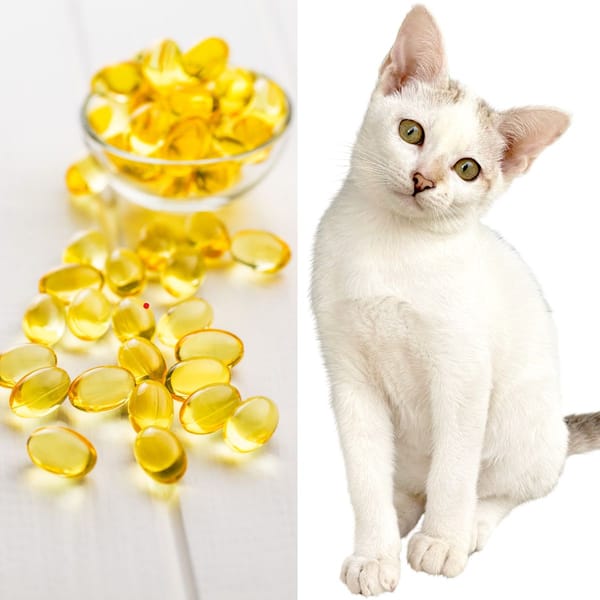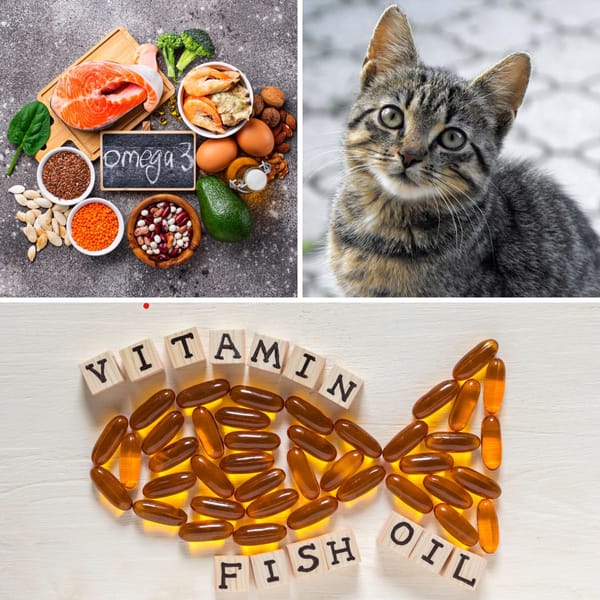Key Takeaways:
- Understanding the correct dosage of fish oil for cats is crucial for their health.
- Fish oil can provide numerous health benefits for cats, including improved skin and coat health.
- Consultation with a veterinarian is essential before adding fish oil to your cat's diet.
Fish oil is a popular dietary supplement for humans, and its benefits extend to our feline friends as well. Packed with essential fatty acids like eicosapentaenoic acid (EPA) and docosahexaenoic acid (DHA), fish oil for cats can support various aspects of their health. But as pet owners, it's important to ask: how much fish oil should you give a cat?
The Importance of Fish Oil in a Cat's Diet
Fish oil supplements are renowned for their rich content of omega-3 fatty acids, which are essential for cats. Unlike some animals, cats cannot produce these fatty acids on their own, so they must be included in their diet. These nutrients are vital for maintaining healthy cell membranes, supporting the immune system, and reducing inflammatory conditions.
Determining the Right Fish Oil Dose for Cats
When it comes to fish oil dose, the amount can vary depending on the cat's weight, age, and overall health. Generally, a safe starting point is to administer fish oil at a dose of around 20-55 mg of EPA and DHA per kg body weight daily. However, it's crucial to consult with a veterinarian to determine the appropriate dosage for your precious feline.
The Benefits of Fish Oil Supplements for Cats
Fish oil supplements can help manage chronic conditions such as heart disease, arthritis, and chronic kidney disease in cats. They also promote a shiny coat, reduce skin allergies, and can aid in delayed wound healing. The anti-inflammatory properties of fish oils make them a valuable addition to a cat's diet.
Choosing the Best Fish Oil for Your Cat
When selecting fish oil products, it's important to choose a reputable company that provides specially formulated supplements for pets. Look for products that come in glass containers to avoid the risk of toxins leaching from plastic and ensure the fish oil is sourced from cold water fish like wild-caught salmon, rather than farm-raised fish, which may have the same exposure to heavy metals, especially mercury.
Liquid Fish Oil vs. Fish Oil Capsules
Liquid fish oil can be mixed directly into your cat's food, making it a convenient option for pet owners. Fish oil capsules, on the other hand, may be more suitable for cats that are picky eaters, as they can be hidden in treats or food. Both forms can be effective, but it's essential to administer them correctly to avoid gastrointestinal disease or adverse effects.
Fish Oil and Veterinary Medicine
In veterinary medicine, fish oil supplementation is often recommended for cats with specific health issues. It's important to follow the recommended doses provided by your vet, as they are tailored to your cat's unique health needs. High doses of fish oil can lead to nutrient excess, altered platelet function, and drug interactions, so veterinary guidance is key.
The Role of Fish Oil in Managing Skin Allergies
Cats suffering from skin allergies may benefit from fish oil supplementation. The omega-3 fatty acids in fish oil can help soothe itchy skin and reduce inflammation. However, it's important to introduce fish oil into your cat's diet gradually to monitor for any potential allergic reactions or altered immune function.
Fish Oil for Cats with Chronic Kidney Disease
Fish oil has been shown to have therapeutic use in cats with chronic kidney disease. By decreasing platelet aggregation and providing anti-inflammatory effects, fish oil can help improve kidney function and slow the progression of the disease. Always consult with a vet before starting any new supplement for a cat with chronic kidney disease.
Fish Oil Supplement vs. Other Sources of Omega Fatty Acids
When considering a fish oil supplement for your feline friend, it's essential to compare it with other sources of omega fatty acids. Cats require a balance of both omega-3 and omega-6 fatty acids, which are found in animal fats and certain plant oils. While fish oil is an excellent source of omega-3s, like EPA and DHA, it's not the only option. Flaxseed oil, for instance, is a plant-based source that provides alpha-linolenic acid (ALA), a precursor to the omega-3 fatty acids found in fish oil. However, cats are not efficient at converting ALA to EPA and DHA, making fish oil a more direct and beneficial source.
On the other hand, arachidonic acid, an essential omega-6 fatty acid for cats, is primarily found in animal fats. It's crucial to maintain a proper diet that includes both types of fatty acids in the right balance. Over-supplementation of omega-3s can lead to a deficiency in omega-6s, and vice versa. Therefore, while fish oil pills are a great addition to your cat's diet, they should be part of a comprehensive approach to dietary supplements that considers all aspects of your cat's nutritional needs.
The Role of Fish Oil in Weight Management and Toxin Exposure
Incorporating fish oil supplements into your cat's diet can play a significant role in managing your cat's weight. Omega-3 fatty acids, found in fish oil, are known to influence metabolic functions, which can help maintain a healthy weight in cats. When combined with a proper diet and regular exercise, fish oil can contribute to a leaner body mass and prevent obesity, a common issue in domestic cats. It's important to adjust the dosage of fish oil pills according to your cat's weight to avoid over-supplementation, which can lead to unwanted weight gain due to the high caloric content of fats.
Moreover, the source of the fish oil is a factor to consider regarding toxin exposure. Farm-raised salmon, for example, may have a different exposure to toxins compared to wild-caught fish. While both can provide beneficial omega fatty acids, wild-caught fish are often considered to have a lower risk of containing pollutants that can lead to toxin exposure in cats. Additionally, fish oil has been shown to decrease platelet aggregation, which can be beneficial for cats with certain health conditions, but it's essential to consult with a veterinarian to ensure safe and appropriate use.
Nutritional Supplements and Commercial Pet Foods
Many commercial pet foods already contain a nutrient blend that includes fish oil. However, the levels may not be sufficient for therapeutic effects. Adding fish oil supplements to your cat's current diet can ensure they receive the optimal amount of essential fatty acids.
Understanding the Safe Upper Limit of Fish Oil
It's important to be aware of the safe upper limit when giving fish oil to cats. Exceeding this limit can lead to adverse effects such as heavy metal toxicity and altered immune function. Always adhere to the dosage recommended by your vet or the fish oil product's guidelines.
Fish Oil and Heart Disease in Cats
Fish oil's anti-inflammatory properties can benefit cats with heart disease by improving cardiac function and reducing the risk factors associated with cardiovascular conditions. The EPA and DHA in fish oil are key components in managing heart health in cats.
The Therapeutic Dose of Fish Oil for Different Life Stages
Cats at different life stages may require varying amounts of fish oil. Kittens, adult cats, and senior cats all have unique dietary needs, and the therapeutic dose of fish oil should be adjusted accordingly. Consult with a vet to determine the right amount for your cat's life stage.
Fish Oil on an Empty Stomach: Is It Safe?
Administering fish oil on an empty stomach can lead to gastrointestinal upset in some cats. It's generally recommended to give fish oil with food to minimize the risk of adverse effects. Observe your cat's reaction when introducing fish oil to their diet and adjust as needed.
The Nutritional Value of Farm-Raised vs. Wild-Caught Fish
The source of fish oil matters when it comes to its nutritional value. Wild-caught salmon and other cold-water fish are typically higher in omega-3 fatty acids compared to farm-raised fish. This is due to the natural diet of predatory fish, which includes smaller fish rich in these essential nutrients.
Restoring Wild Salmon Populations for Sustainable Fish Oil
Sustainability is an important consideration when choosing fish oil products. Opting for brands that support efforts to restore wild salmon populations can ensure a more sustainable source of fish oil while also contributing to environmental conservation.
The Impact of Fish Oil on Cell Membranes and Inflammatory Conditions
Fish oil plays a crucial role in maintaining the integrity of cell membranes, which is essential for the proper functioning of all body systems. Its anti-inflammatory effects can also help manage inflammatory conditions in cats, providing relief and improving their quality of life.
Fish Oil Supplementation: A Case Study
A case study involving an adult cat with skin allergies showed significant improvement after the introduction of fish oil into its diet. The cat's coat became shinier, and the frequency of allergic reactions decreased. This practical example highlights the potential benefits of fish oil supplementation for companion animals.
Summary
Fish oil can be a beneficial supplement for cats, offering a range of health advantages from improved skin and coat condition to the management of chronic diseases. The key is to determine the right fish oil dose, which typically ranges from 20-55 mg of EPA and DHA per kg body weight daily, and to consult with a veterinarian for personalized advice. Choosing high-quality fish oil products from reputable sources and administering them correctly is essential to ensure your cat reaps the benefits without any adverse effects.
FAQ Section
Q: Can fish oil supplements be harmful to cats? A: While fish oil can be beneficial, it's important to adhere to the recommended dosage. High doses can lead to adverse effects such as nutrient excess and altered platelet function. Always consult with a veterinarian before starting your cat on fish oil supplements.
Q: How do I know if my cat needs fish oil supplements? A: Signs that your cat may benefit from fish oil supplements include dry skin, dull coat, or the presence of inflammatory conditions. However, it's best to consult with a vet to determine if fish oil is appropriate for your cat's diet.
Q: Can I give my cat human fish oil supplements? A: It's recommended to use fish oil products that are specially formulated for cats. Human supplements may contain different concentrations and ingredients that are not suitable for cats. Always choose products designed for pet use and consult with a v







